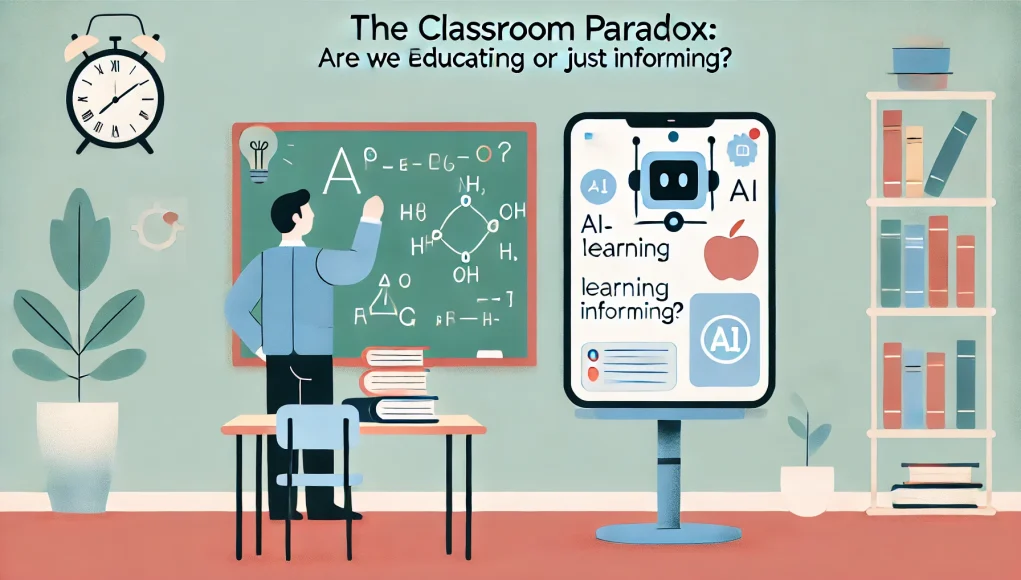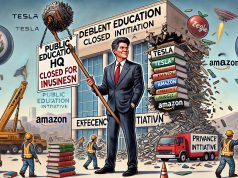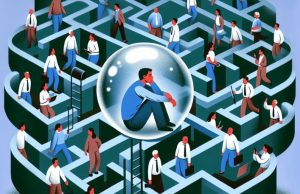Imagine a blacksmith in the early days of the Industrial Revolution. He hammers away, passing down his craft to apprentices who, with years of practice, become master smiths themselves. Then, machines arrive—capable of shaping metal faster, stronger, and with greater precision. The old master has two choices: resist change and keep hammering as the world moves on, or embrace the new tools, redefine his craft, and teach his apprentices to do the same.
Our education system stands at a similar crossroads today. For centuries, it has followed a predictable script: impart knowledge, test retention, certify success. But in a world where AI can generate essays, solve complex equations, and even tutor students one-on-one, the central question emerges—should education remain an act of teaching, or must it transform into something greater?
Education: A System Stuck in Its Own Loop
The modern education system, largely designed in the 19th century, was built to create workers for an industrial economy—disciplined, literate, and process-oriented individuals. The factory model of education, as Sir Ken Robinson famously critiqued, prioritizes uniformity and efficiency over creativity and adaptability.
- Teaching as Transmission: Traditional education is about content delivery—students absorb facts, replicate methods, and demonstrate mastery through exams.
- Testing Over Thinking: Success is measured by test scores, not by the ability to ask better questions or synthesize new ideas.
- Curriculum Lag: While the world moves at breakneck speed, school curriculums are often outdated by the time they’re implemented.
This approach worked when knowledge was scarce and hard to access. But today, AI tutors (think Khan Academy’s AI companion), research assistants (like ChatGPT), and problem-solvers (Wolfram Alpha, AutoML) can make knowledge more accessible than any textbook ever could. If the teacher’s role is merely to transfer information, then AI is already outpacing us.
So, what should education look like in an AI-driven world?
From Teaching to Transforming: The New Purpose of Education
If AI can teach, should humans stop doing it? Of course not. But instead of being mere distributors of information, educators must become facilitators of transformation.
1. Teaching Humans to Be More Human
In a world where machines can optimize, calculate, and analyze, what remains uniquely human? Creativity, empathy, ethics, critical thinking—these must take center stage in education. Schools should pivot toward:
- Problem-Based Learning: Tackling real-world challenges where AI is a tool, not the answer.
- Ethical Reasoning: Understanding AI’s biases, implications, and responsibilities.
- Interdisciplinary Thinking: Blurring lines between subjects to foster holistic problem-solving.
2. Education as Adaptation, Not Certification
Degrees were once a signal of expertise. Today, learning agility matters more. Instead of rigid curriculums, education should shift toward:
- Lifelong Learning Models: Continuous upskilling, micro-certifications, and on-demand knowledge acquisition.
- AI as a Learning Partner: Instead of banning AI tools in schools, we should be teaching students how to use them effectively—just like calculators weren’t the end of math but an enhancement.
- Personalized Learning Paths: AI can tailor education to individual needs, moving beyond the “one-size-fits-all” approach.
3. Learning as Ecosystem, Not Institution
Education shouldn’t be confined to a school or university. Instead, it should be a thriving ecosystem where:
- Communities become classrooms—learning from industry, nature, and society.
- Peer Learning is valued—students co-create knowledge rather than passively receive it.
- AI augments, not replaces, human interaction—technology enhances collaboration, not isolates individuals.
The Future of Education: A Mindset Shift
Much like the blacksmith who evolved from hammering metal to mastering industrial tools, educators must shift from mere instructors to curators of curiosity, architects of critical thought, and mentors of moral intelligence. AI will change how we learn, but the why of education must be redefined.
The question isn’t whether AI will disrupt education—it already has. The real challenge is: will we let AI reduce education to a transactional process, or will we leverage it to elevate human potential? The future belongs to those who choose transformation over tradition.
Let’s build an education system that doesn’t just teach. Let’s build one that transforms.
What’s Your Take?
Are we clinging too tightly to outdated education models? How should AI be integrated into learning without diminishing human creativity? Let’s discuss.


























